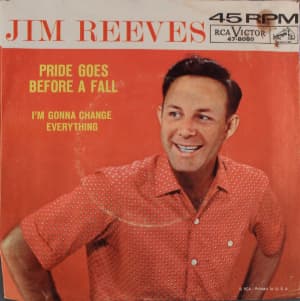
💔 The Heartbreaking Vow to Erase a Lost Love: A New Dawn Born of Despair
Sometimes, a song catches a truth so universal, so raw, that it simply transcends genre and time, speaking directly to the quiet ache in every heart that has ever known loss. Such is the enduring power of Jim Reeves’ 1962 single, “I’m Gonna Change Everything.” This gentle, yet fiercely determined ballad captures that moment of devastating clarity after a relationship ends, when the only way forward seems to be a total, painful purging of the past. The narrator isn’t just deciding to move on; he’s vowing to obliterate every single physical trace of his former lover, because every object, every curtain, every floorboard seems to cry out their name.
At the time of its original release in 1962, this compelling track, produced by the legendary Chet Atkins for RCA Victor, quickly resonated with the public. It ascended to a remarkable No. 2 on the U.S. Billboard Hot Country Singles chart, solidifying Reeves’ place as one of the most successful and versatile voices of the ’60s. The song’s crossover appeal, a hallmark of Reeves’ “Nashville Sound,” also saw it make a respectable showing on the pop charts, hitting No. 95 on the Billboard Hot 100, and it found a home overseas, charting at No. 42 in the UK. This success was a testament to the song’s universal theme, delivered with Reeves’ signature velvet-smooth baritone—a voice so warm, it could sell comfort and heartbreak in the very same breath.
The story behind the song is one of straightforward, brilliant songwriting. Penned by Alex Zanetis, a prolific writer of country hits, the lyrics paint a stark picture of a man surrounded by ghosts. It’s not a complicated plot; it’s a detailed, emotional inventory of a shared life. The pictures on the wall, the chairs, the window curtains, the candle set, the records they played on the hi-fi—all must go, replaced, or burned. This isn’t abstract poetry; it is a literal, tactical plan for emotional survival. It’s an act of desperation framed as resolve: a man deciding to redecorate his life to escape a memory that is suffocating him.
The deeper meaning of “I’m Gonna Change Everything” lies in the human struggle to reconcile a painful ending with the beautiful memories that cling to familiar surroundings. For a generation that often valued physical mementos and domestic stability, the act of tearing down a home’s familiar anchors—”take the pictures off the wall and burn ’em,” “take the carpet off the floor throw it out the door it’s filled with tears”—was a truly devastating metaphor. It speaks to the ultimate powerlessness a person feels when love is gone, forcing them to find strength in a drastic, even irrational, clean slate. The concluding thought, “Every night I dream I’ll dream of someone new,” is the faint, fragile hope that underpins the entire act of destruction; the goal isn’t vengeance, but a desperate search for peace. It’s a poignant, heartbreaking echo of what so many of us felt when we had to rearrange a room or simply turn our backs on a familiar spot just to breathe again.
Reeves’ performance is key. He delivers the words not with anger, but with a quiet, world-weary resolve—the voice of a gentleman who has reached his limit. This gentle delivery of such fierce intent is what made Reeves “Gentleman Jim” and allowed this song to cross over so effortlessly. The soft, lush orchestration that Chet Atkins wove around him—the signature “Nashville Sound”—gave it a sophistication that appealed far beyond the traditional country audience. It’s a song for anyone who ever packed up a box of old love letters and felt the heavy finality of a life that would never be the same. The track later became a favorite cover for artists from different spheres, including Dean Martin and Jimmy Roselli, proving its timeless emotional core.